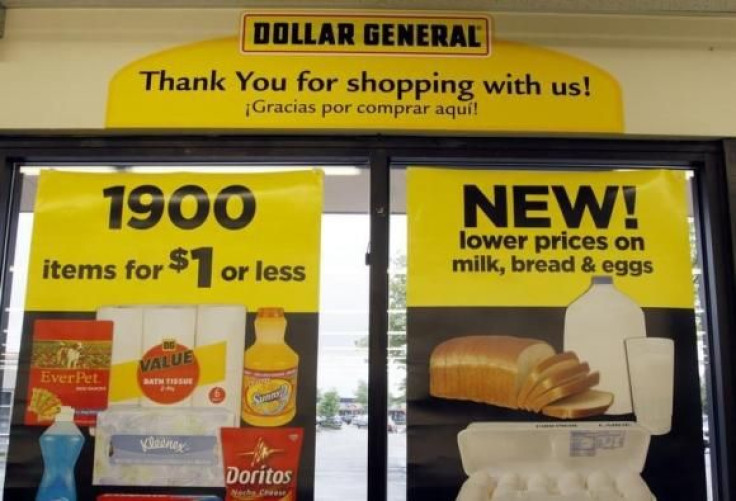Dollar General Enters Race For Family Dollar With $8.95 Billion Bid

(Reuters) - Dollar General Corp offered to buy Family Dollar Stores Inc for $8.95 billion, trumping a bid by Dollar Tree Inc and aiming to strengthen its dominance of a growing segment of retailers serving penny-pinching customers.
Shares of Family Dollar, the No. 2 U.S. discount chain, rose as much as 5.2 percent to $80.00 in regular trading, above the offer price of $78.50 per share in cash, suggesting that investors anticipate a bidding war.
"Both Dollar General and Dollar Tree have some capacity to go a little bit higher with the offer price," said Joseph Feldman, analyst at Telsey Advisory Group.
Dollar stores have been a popular choice for low- and middle-income U.S. consumers in a weak economy.
At the same time, Wal-Mart Stores Inc and other large retailers which serve a similar customer base have been struggling with weak sales amid a cutback in spending and a shift in preferences to stores nearer to home.
The U.S. market for dollar stores grew 45.7 percent to $48.2 billion between 2008 and 2013 and is expected to grow 18 percent in the next five years, according to Euromonitor International.
But the growth has recently started slowing due to intense competition, Kahn said.
"We have a tremendous amount of strength in the rural communities and we have things to learn in the metro," Dollar General Chief Executive Rick Dreiling said on a conference call. "Family Dollar is just the reverse."
The combined company would have nearly 20,000 stores across 46 U.S. states and annual sales in excess of $28 billion.
It would also allow Dollar General to retain its No. 1 spot among U.S. dollar stores. Dollar Tree's $8.5 billion bid for Family Dollar, announced on July 28, would have vaulted that merged company ahead of Dollar General.
Combined, the three dollar chains' annual sales total about $35 billion - less than a tenth of Wal-Mart's $473 billion.
Dreiling, who will postpone a retirement planned for next year to stay on as CEO of the combined company through May 2016, said Dollar General had faced stiffer competition from new Family Dollar stores than from Wal-Mart.
Both Dollar General and Family Dollar offer goods at multiple price points, while Dollar Tree sticks rigidly to a $1 or less format. This - along with the location of Dollar General and Family Dollar stores - would make Dollar General a more likely buyer, analysts said.
Family Dollar's presence is biggest in Texas and the eastern United States. Texas is also home to more Dollar General stores than any other state - more than 1,000 stores, or about a tenth of the total.
Family Dollar said on Monday it was reviewing Dollar General's offer, but has not changed its recommendation in support for a merger with Dollar Tree.
Family Dollar had agreed to a $74.50 per share cash and stock deal with Dollar Tree last month.
Billionaire investor Carl Icahn, who in June took a 9.4 percent stake in Family Dollar, had pushed Family Dollar to sell itself to Dollar General.
On Monday, Icahn said he was "surprised" by Family Dollar's deal with Dollar Tree.
He questioned whether Family Dollar CEO Howard Levine's future role at Dollar Tree could have influenced the company to go ahead with the deal.
Dollar Tree said last month that Levine would remain as Family Dollar CEO after the acquisition.
Icahn has cut his stake in Family Dollar to 3.6 percent from 9.4 percent as of July 30.
Activist investor Nelson Peltz-led Trian Partners was Family Dollar's second-largest shareholder as of July 27 with a 7.34 percent stake.
Dollar Tree declined to comment.
Dollar General's offer, made in a letter to Family Dollar's board, represents a premium of 3.2 percent to Family Dollar's Friday close.
The enterprise value of the offer is $9.7 billion, higher than Dollar Tree's $9.2 billion.
Dollar General's shares closed up 11 percent at $64.14, while Dollar Tree's shares closed down 2.4 percent at $54.26.
ANTITRUST CONCERNS
Dreiling, who said he would not have announced his retirement had he known a deal between Family Dollar and Dollar Tree was under way, said antitrust approval for Dollar General's bid was not a concern.
Dollar General is prepared to divest up to 700 retail stores to get regulatory approval for the deal, the same percentage that Dollar Tree had proposed.
Edward Jones analyst Brian Yarbrough, however, said that more closings or divestitures might be needed.
"Any market where they are dominant, and they are the only two players, is going to be questioned," he said.
Antitrust lawyer Jared Bona of Bona Law, however, said the deal was likely to pass regulatory muster without much trouble.
"I would be surprised if this deal is challenged under the antitrust laws because Dollar General is apparently willing to divest up to 700 retail stores to obtain antitrust approval. Stating that up front means they probably don’t want a fight," he said.
A U.S. Federal Trade Commission spokeswoman declined to comment. The FTC and the U.S. Justice Department share the responsibility for federal antitrust review of corporate mergers and acquisitions.
Dollar General said it expected annual synergies of $550 million-$600 million three years after the deal closes. Dollar Tree had said it expected $300 million in annual savings by 2018.
Dollar General has financing from Goldman Sachs and Citigroup Global Markets Inc for the deal, including a $305 million termination fee payable to Dollar Tree.
© Copyright IBTimes 2024. All rights reserved.











